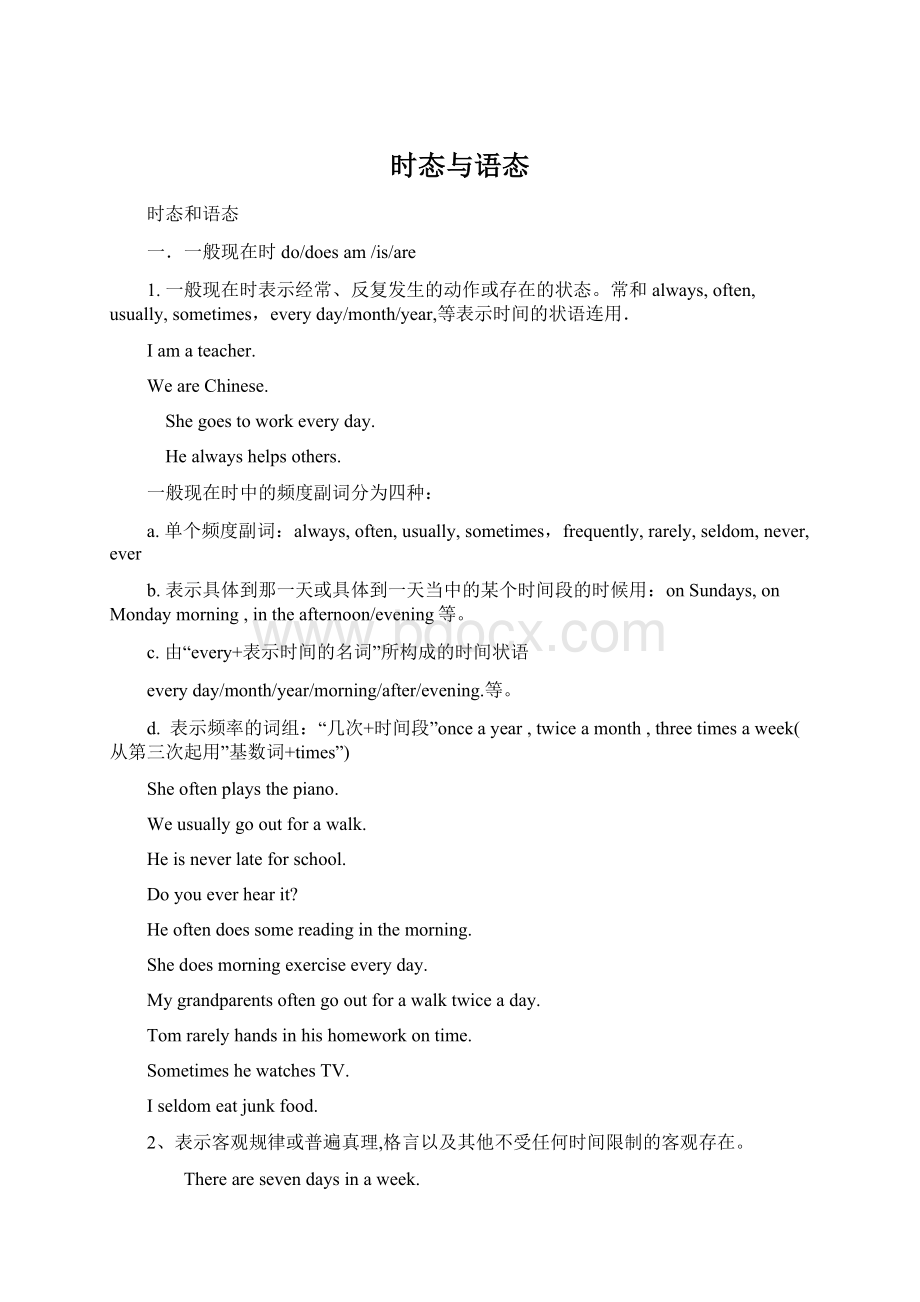时态与语态.docx
《时态与语态.docx》由会员分享,可在线阅读,更多相关《时态与语态.docx(15页珍藏版)》请在冰豆网上搜索。

时态与语态
时态和语态
一.一般现在时do/doesam/is/are
1.一般现在时表示经常、反复发生的动作或存在的状态。
常和always,often,usually,sometimes,everyday/month/year,等表示时间的状语连用.
Iamateacher.
WeareChinese.
Shegoestoworkeveryday.
Healwayshelpsothers.
一般现在时中的频度副词分为四种:
a.单个频度副词:
always,often,usually,sometimes,frequently,rarely,seldom,never,ever
b.表示具体到那一天或具体到一天当中的某个时间段的时候用:
onSundays,onMondaymorning,intheafternoon/evening等。
c.由“every+表示时间的名词”所构成的时间状语
everyday/month/year/morning/after/evening.等。
d.表示频率的词组:
“几次+时间段”onceayear,twiceamonth,threetimesaweek(从第三次起用”基数词+times”)
Sheoftenplaysthepiano.
Weusuallygooutforawalk.
Heisneverlateforschool.
Doyoueverhearit?
Heoftendoessomereadinginthemorning.
Shedoesmorningexerciseeveryday.
Mygrandparentsoftengooutforawalktwiceaday.
Tomrarelyhandsinhishomeworkontime.
SometimeshewatchesTV.
Iseldomeatjunkfood.
2、表示客观规律或普遍真理,格言以及其他不受任何时间限制的客观存在。
Therearesevendaysinaweek.
Theearthgoesroundthesun.
Thesunrisesintheeastandsetsinthewest.
Thewaterboilsat100℃.
Actionsspeakslouderthanwords.行动胜于言辞。
(谚语)
3.表示主语现在的特征,性格和状态。
Thedictionarybelongstome.(状态)
Jennyisaprettygirl.(特征)
4.在连词if,unless,suppose,aslongas等引导的条件状语从句中,常用一般现在时表示将来的动作。
Ifitisfinetomorrow,we’llhaveafootballmatch.
Aslongasyoudon’tloseheart,youwillsucceed.
5.在由when,before,assoonas,until,once,themoment(that),等引导的时间状语从句中,常用一般现在时表示将来的动作。
I’llringyouupbeforeIleavetheoffice.
WhenIfinishmyhomework,I’lltellyouastory.
IwillgowithyouassoonasIfinishmytask.
6.在由nomatterwho/what/which/when/where/how或whatever,whoever,whichever,whenever,wherever,however引导的让步状语从句中,从句用一般现在时表示将来。
主句常出现will/shall/can/must或祈使句,以此表示将来的时态。
Whateveryousay,Iwillnotchangemymind.
Whereveryougo,youcanmeetfriendlypeople.
Howeverhardtheworkis,youmustfinisheditontime.
Whateveryoudo,pleasebehonest.
7、表示安排或计划要做的事情(带有时间状语),在此结构中常用的谓语动词有go,come,leave,start,stop,open,return,arrive,begin,close等表示位移或方向动词,都表示近期时间内的计划或安排。
(近期将来)
Mytrainleavesat6:
30thismorning.-
HearrivesinShanghaithedayaftertomorrow.
Westartat8tomorrowmorningforBeijing.
8.以here,there开头的句型用一般现在时表示正在发生的动作。
Herecomesabus.
Theregoesthebell.
9.在某种语境中,要用一般过去时表现在(暗示现在不这样了)。
----Oh,howniceofyou!
Ineverthoughtyouweregoingtobringmeagift.
10.一般现在时还可用在戏剧,电影的剧本解说,体育比赛的解说以及图片的说明等场合。
Tomcarriestheballtotheleft.汤姆把球带到左方。
Thepictureshowsushowtheybuiltthemotorwaylastyear.
这张照片给我们展示了他们去年如何建设高速公路。
二.一般过去时:
did;be(was/were)was/were+P.P
1.一般过去时表示过去发生的事情或存在的状态。
常与yesterday,yesterdaymorning(afternoon,evening),in+年代,thismorning,justnow,amomentago,inMay,lastnight/year/week,onceuponatime,theotherday,atthattime,inthepast连用。
TomcametoChinatwoyearsago.
Jennygraduatedfromuniversityin2005.
TheywenttotheparklastSunday.
Weplayedfootballyesterdayafternoon.
Hewasanengineeratthattime.
2.表示在过去一段时间内的经常性或习惯性动作。
常与everyday,often,always,usually,sometimes,frequently,rarely,seldom,never,等频度副词连用。
Weoftenplayedtogetheratthattime.
WhenIwasinthecountryside,Isometimesswamintheriver.
Johndidmorningexerciseeverydaywhenhewasauniversitystudent.
3.usedtodo和woulddo表示过去经常或反复发生的动作。
usedtodo强调今昔对比。
woulddo不强调今昔对比,说不定跟以前一样。
Heusedtosmokealot,buthedoesn’tnow.
Whatweusedtothinkwasimpossiblebutnowdoesseempossible.
Wheneverwewereintrouble,hewouldhelpus.
4.一般过去时表示过去发生的一连串动作。
Themonkeyjumpedoffthetree,pickedupabigstoneandthrewitatus.
Heopenedthedoor,rushedoutandthendisappeared.
5.在时间,条件,让步状语从句中,从句用一般过去时表示过去将来的动作。
Hesaidhewouldwaituntiltheycameback.
Theysaidtheywouldcometoseemeifhegotthere.
6.动词的过去式变化规则:
(1)一般在动词后加-ed。
offer—offered,weigh—weighed,destroy—destroyed,
(2)在以字母e结尾的动词后,只加-d。
like—liked,provide—provided,
(3)在以“辅音字母+y”结尾的动词后,则改y为i,再加—ed。
supply—supplied,fly—flied,study—studied
(4)在以重读闭音节结尾且末尾只有一个辅音字母的动词后,双写最后一个辅音字母,再加-ed。
plan—planned,refer—referred,regret—regretted,ban—banned.
动词的过去式不规则变化通常需要逐个记忆。
注意:
有些动词的过去时,expect,hope,intend,plan,wanted等一般过去时,后接不定式的完成时;或它们的过去完成时接不定式的一般式,都可表示过去未曾实现的意图、打算或希望。
Ihopedtohavebeeninvitedtohisweddingparty.
—Ihadhopedtobeinvitedtohisweddingceremony.
我本希望他来邀请我参加他的婚礼。
Iintendedtohavejoinedtheirgames.
—Ihadintendedtojointheirgames.我本打算参加他们的比赛。
三.一般将来时
1.a.“will+V.原形”表示将来发生的动作或存在的状态,常与soon,tomorrow,
thedayaftertomorrow,nextyear/month/week/day,someday,fromnowon,
inthefuture等表示将来的时间状语连用。
Ishall/willgotoBeijingnextmonth.
Idon’tknowwhatwillhappeninthefuture.
b.“will+V.原形”还可以表示事物固有的属性或必然趋势。
Fishwilldiewithoutwater.
C.用“will(shall仅用于第一人称)+V.原形”条件:
表示单纯的未来
不能用于条件句中
表示必然的将来
表意愿,决心
Hewillcomeheretojoinustomorrow.
2.begoingto+V原:
多用于口语中,表示计划打算做某事;表示通过客观迹象预示着······
I’mgoingtoseethefilmtonight.(计划打算)
Lookatthedarkclouds,itisgoingtorainsoon.(客观迹象预示着······)
3.beabouttodosth.和beonthepointofdoingsth.都表示“即将或正要做某事”,不与时间状语连用,但可与when从句连用,(与when连用常用过去时态)。
Thetrainisabouttostart.
Iwasabouttoprepareforthedinnerwhensomeoneknockedatthedoor.
Iwasonthepointofsleepingwhenthetelephonerang.
4.beto+V.原
a.按计划或安排要做的事.
Wearetoattendthemeeting.
Sheistobemarriednextmonth.
Tomistovisithisgrandparentsthisweekend.
此结构可用于过去时态,表示“过去计划将要做的事,但不表明是否实施”。
IfeltverynervousbecauseIwassoontoleavehomeforthefirsttime.
用“was/weretohavedonesth.”表示过去计划做某事但未曾实现。
Weweretohavetoldyou,butyouwerenotin.
b.表示“应该”相当于情态动词should和oughtto
Youweretoreporttothepolice.
Whatistobedone?
c,表示“必须”相当于情态动词must和haveto
Youweretofinishthetaskintwohours.
d.表示“想要打算”,相当于want,intend
Ifweweretobetherebeforeten,wewillhavetogonow.
e.用于否定句中,表示禁止(命令),相当于mustn’t
Thebooksinthereadingroomarenottobetakenoutside.
Youarenottosmokehere.
f.用于第一人称疑问句中,表示征求对方意见。
Whatarewetodonext?
AmIgoonwiththework?
g.表示“可能,可以”,相当于can,may.
Suchpeoplearetobefoundeverywhere.
Thisnewsistobefoundinthenewspaper.
h.weretobedo用于if或evenif/though引导的从句中,表示对未来的假设。
IfIweretotellyouthatIkilledhim,wouldyoubelieveme?
Evenifthesunweretoriseinthewest,Iwouldneverdosuchathing.
5.位移动词或方向动词go,come,leave,start,stop,open,return,arrive,begin,close,move,setout等用一般现在时或现在进行时表示按计划或安排将要发生的动作或状态。
(近期的将来)
Mytrainleavesat6:
30thismorning.-
HearrivesinShanghaithedayaftertomorrow.
Westartat8tomorrowmorningforBeijing.
WhatareyougoingtodothisFridayevening?
6.祈使句+and/or+主语+will/won’t···
Workhardandyouwillpasstheexam.
Don,tbelazyoryouwon’tgetawholesalary.
四.过去将来时态讲解及练习 (立足过去,着眼未来)
1. 过去将来时一般不独立使用,常跟在宾语从句和间接引语中。
它表示从过去某一时间来看将要发生的某个动作或存在的某种状态。
(would+V.原)
MarytoldmethatshewouldgotoShanghaibyplane.
Shesaidshewouldcomeheretojoinusthefollowingday.
HeaskedmeifIwouldstayhere.
2.was/weregoingto+ V.原:
过去计划,打算将要做的事。
Shesaidthatshewasgoingtotakeanexam.
Wewantedtoknowwhethershewasgoingtospeakatthemeeting.
3.was/wereabouttodosth.和was/wereonthepointofdoingsth.“即将做某事/正要做某事”,常与when连用。
Iwasonthepointofcookingwhensomeoneknockedatthedoor.
4.was/wereto+V.原:
过去按计划将要做的事,但不表明是否实施。
IwasverynervousbecauseIwassoontoleavehomeforthefirsttime.注意:
weretodosth.用于if/evenif/eventhough引导的从句,表示对将来的假设。
IfyouweretoaskHarrywhatwasinthebottle,hewouldtellyouthatitcontainedperfumedmud。
EvenIfthesunweretorise in the west,Iwouldneverdosuchathing..
五.现在进行时be(am,is,are)+V.-ing被动:
am/is/are)+being+P.P
1,表示说话时正在进行或发生的动作。
Pleasedon'tmakesomuchnoise.I'mwritingacomposition.
It'sfouro'clockintheafternoon.Thechildrenareplayingfootballonthesportsground.
Hurryup!
Weareallwaitingforyou.
Look!
Theyarereadingoverthereunderthetree.
Listen!
Sheissingingintheroom.
WhereisKate?
Sheisreadingintheroom.
Whyareyoucrying?
Issomethingwrong?
2,表示现阶段正在进行的动作或持续的状态。
Weareworkinginafactorythesedays.
Theyarecompilingadictionary.
这类情况常与today今天,thisweek这个星期,thisevening今天晚上,thesedays现在、目前等时间状语连用。
3,表示说话人现在对主语的行为表示赞叹或厌恶。
常与always,usually,continually,constantly,forever等副词连用。
He'salwaysquarrellingwithothers.
Sheisconstantlyworryingaboutherson'shealth.
Theboyisforeveraskingquestions.
e,go,leave,depart,arrive,reach,start,return等卫衣,方向动词用于现在进行时表示最近的计划或安排。
主语必须是人。
TheyareleavingforNewYorktomorrow.
Isyourbrotherdepartingsoon?
Heiscomingtoseemethedaybeforeaftertomorrow.
5.当句中还有look,listen,canyousee...,can’tyousee...之类的暗示语时,要使用现在进行时。
Listen!
Someoneissinginginnextroom.It’ssobeautiful.
Bequiet,please!
Can’tyouseethebabyissleeping.
6.下列动词不能用于现在进行时
1).表示好恶的动词(喜欢/不喜欢):
like,dislike,hate...
2).表示希望的动词:
hope,wish,want,wouldlike...
3).表示归属的动词:
have,belong···
4).表示思维,理解,知识的动词:
know,forget,understand,think等。
7,有的现在进行时句子和一般现在时同义。
用现在进行时表示问者的关切心情。
Howareyoufeelingtoday?
(Howdoyoufeeltoday?
)你今天感觉如何?
Iamlooking(look)forwardtoyournextvisit.我盼望你下次再来。
Whyareyoulooking(doyoulook)sosad?
为什么你看起来这么愁眉苦脸的样子呢?
完成,find发现,rise增强等.
6.过去进行时was/were+V.-ing
1.表示过去某一时刻或某一段时间正在进行的动作或存在的状态。
这个时间可以通过上下文暗示,也可通过时间状语来体现。
常用表示过去的时间状语有:
then,atthattime,thistime,yesterday,attenyesterday,
yesterdaymorning/afternoon/evening.
Iwasdoingmyhomeworkthistimeyesterday.
JennywascookingwhenIknockedatthedoor.
IwasplayingcomputergameswhilemyparentswerewatchingTV.
2.过去进行时常与always,constantly,cont